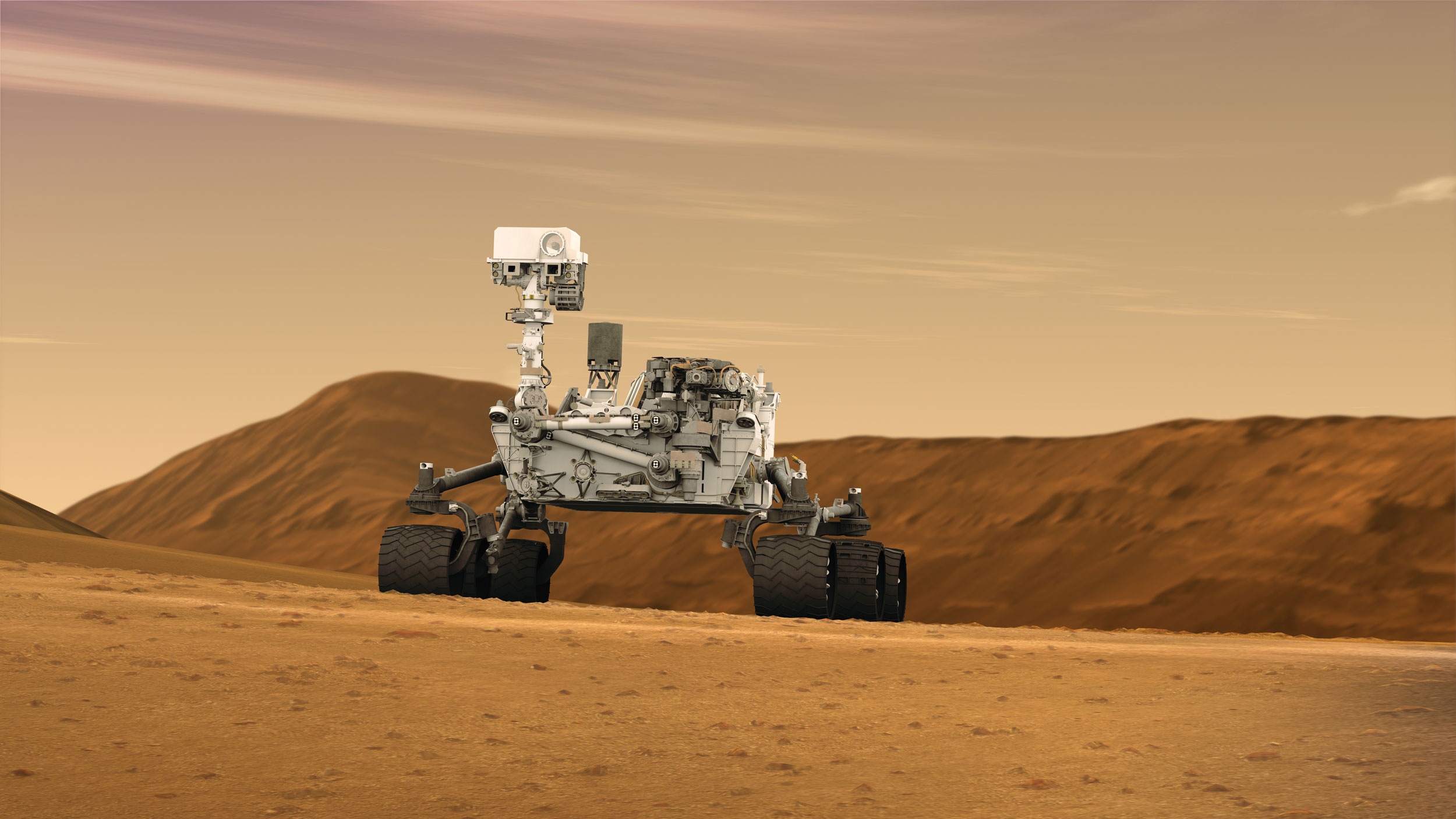Nadia Tokovic
Mr. Youell
9E Science
17 January 2015
The past 2014 year has been a very important and eventful year for space discoveries and breakthroughs. I am going to talk about 3 articles that are in my opinion the most important of space news in the last year: the Rossetta Philae Probe landing on comet, Rosetta's discovery of water on the comet, and the Curiosity Rover finding evidence that might be life on Mars. All three of these events are news from spacecrafts constructed by scientists in order to discover things we could never discover by just staying on Earth. It is very important for people to use new technologies in scientific research and that the spacecrafts that I will talk about can, and already are discovering a lot of what is yet unknown to us about space.
Article #1
A space probe named Rosetta along with its Philae lander was launched in 2004 by the European Space Agency (ESA). Its mission is to perform a detailed study of comet 67 P/ Churyumov-Gerasimenko. After 10 years of traveling 6.4 billion kilometers throught the Solar System, on August 6, 2014, Rosetta arrived at the comet's orbit. This is when it became the first spacecraft to reach a comet and orbit it. Then, on November 12, 2014, Rosetta's Philae lander began its 7 hour descent onto the surface of the comet. A signal comfirming the sucessful touchdown arrived on Earth at 16:03 GMT. This became the first spacecraft to ever land on a comet, and this event was by many named as the top breakthrough of 2014.
This will give scientists a chance to explore the comet, and see what happens as it gets closer to Sun. From the data the Rosetta and Philae collect in their mission scientists hope to find out more about how the solar system was formed, and how comets played a role in bringing water and other complex organics onto planets and possibly Earth.
The landing occurred 510 million kilometers away from Earth , between the orbits of Mars and Jupiter. The speed of comet 67 P/ Churyumov-Gerasimenko was more than 18 km/s. This is a very very large speed and a controlled landing would have been impossible. The landing was completely precalculated and automatic. These are just some of the hardships for the scientists that launched Rosetta. Also they were concerned about the landing, because of the comet's unusual shape, and very bumpy surface. The odds of landing now fell to around 50%, from the 75% that was predicted. The landing spot which was away from boulders but showed a clear view of the comet was named Agilkia.
In conclusion this event was a very big success for the launchers of Rosetta and an extremely important event for space study all around the world. The exploration done by Rosetta on the comet could give scientists very important answers and change many of our views. It is also amazing that this is the first spacecraft to ever go into a comet's orbit, and even land on it. I think that this is definitely one of the most important events of 2014 and will be remembered for a long time.
This will give scientists a chance to explore the comet, and see what happens as it gets closer to Sun. From the data the Rosetta and Philae collect in their mission scientists hope to find out more about how the solar system was formed, and how comets played a role in bringing water and other complex organics onto planets and possibly Earth.
The landing occurred 510 million kilometers away from Earth , between the orbits of Mars and Jupiter. The speed of comet 67 P/ Churyumov-Gerasimenko was more than 18 km/s. This is a very very large speed and a controlled landing would have been impossible. The landing was completely precalculated and automatic. These are just some of the hardships for the scientists that launched Rosetta. Also they were concerned about the landing, because of the comet's unusual shape, and very bumpy surface. The odds of landing now fell to around 50%, from the 75% that was predicted. The landing spot which was away from boulders but showed a clear view of the comet was named Agilkia.
In conclusion this event was a very big success for the launchers of Rosetta and an extremely important event for space study all around the world. The exploration done by Rosetta on the comet could give scientists very important answers and change many of our views. It is also amazing that this is the first spacecraft to ever go into a comet's orbit, and even land on it. I think that this is definitely one of the most important events of 2014 and will be remembered for a long time.
 |
| fig 1. Philae lander lands onto comet 67 P/ Churyumov-Gerasimenko |
 |
| Fig 2. Rosetta's position in time of Philae's landing |
Article #2
Scientists from all over the world have long wanted to know where Earth's water came from. Some of their theories suggested that water could have come onto earth from a comet or asteroid. New data received from the Rosetta spacecraft however, shows that the Earth's water might not have come from comets like scientists have thought. This is because an instrument (called ROSINA) on Rosetta has found that the molecular makeup of the water on the 67 P/ Churyumov-Gerasimenko comet is very different from Earth's water.
 |
| fig 3. ROSINA instrument |
Because the deuterium-to-hydrogen ratio of the water on the comet is very different to Earth's water, even if comets such as 67 P/ Churyumov-Gerasimenko did affect the Earth in it's early existence, the molecular composition would have had to greatly change, which is unlikely. This is why Kathrin Altwegg, who is the principal investigator is ROSINA, believes that it is much more likely that asteroids brought water to Earth. Altwegg knows that scientists measured the deuterium-to-hydrogen ratio in meteorites (which are pieces of the asteroids) and found that the ratio is fairly similar to the one in Earth's water. Asteroids are dry rocky bodies now, but it is thought that around the time of the creation of Earth they were full of water. Altwegg thinks that the water from the asteroids was brought to Earth about 800 million years after the solar system was formed, when asteroids bombarded the young and cooling Earth.
According to Space.com, thanks to Rosetta's discovery scientists have now realized that Kuiper Belt comets are much more diverse than expected for comets from the same origin. This is because when scientists analyzed comet Hartley 2's water composition ratio it appeared to be a lot closer to Earth's water ratio than 67 P/ Churyumov-Gerasimenko's is. This leads us to think that the Jupiter family comets have a much more diverse origin than thought in the past.
Rosetta will now continue it's journey with comet 67 P/ Churyumov-Gerasimenko as it makes ts way around the sun. The closest approach to the sun will be in August 2015, and scientists are hoping to find many more discoveries with Rosetta which could answer many of their questions.
In conclusion I think this discovery is very important and once again proves the importance of the Philae probe's landing onto the comets surface. This is just the first of discoveries that Rosetta's exploration will bring, and already scientists are finding answer to a the really important question of how water came to Earth.
Article #3
According to The Independent, the Curiosity Rover which landed onto Mars in 2012 and now it has found curious spikes of methane which could be evidence of life on the planet. Scientists are unsure of the cause of the methane spikes, but it could be small bacteria-like organisms. Scientists think this because 95% of the methane on Earth comes from microbial organisms. Now they want the Curiosity Rover to test the possibility of life on Mars.
Last year, remains of an ancient freshwater lake in the Gale Crater which could have supported life in the distant past was reported. The laboratory on the rover has also been saying that it has found methane in the atmosphere over past year. NASA says that another explanation for the methane spikes could be degrading organic material which was left behind by meteors which came into contact with Mars.
If the gas is really coming from living organisms, then this would definitely become one of the biggest discoveries in human history. To figure this out scientists are now testing the possibility of life on Mars, and preparing for an unmanned mission, which will search for the source of the methane spikes and will take place in 2020. Now, the Curiosity Rover is taking samples of sedimentary layers, which could perhaps provide clues to the history of Mars and provide us with the answer of where the gas spikes are coming from.
If the gas is really coming from living organisms, then this would definitely become one of the biggest discoveries in human history. To figure this out scientists are now testing the possibility of life on Mars, and preparing for an unmanned mission, which will search for the source of the methane spikes and will take place in 2020. Now, the Curiosity Rover is taking samples of sedimentary layers, which could perhaps provide clues to the history of Mars and provide us with the answer of where the gas spikes are coming from.
 |
| Fig 4. Curiosity rover on the surface of Mars |
I think that these discoveries were the 3 most important of space news in the past year. All 3 of these discoveries could with even further scientific research answer many of the questions that humans want to know about the universe and its creation. The first story is about the first ever landing of a spacecraft onto a comet. This is a huge breakthrough in science and will allow a much further exploration of comets which has never been done before and will give us very important answers and change many of our views. The second story talks about news coming from the Rosetta spacecraft, only a month after landing on the comet, about how water came to Earth. This is just the first of the discoveries that the exploration of the comet will bring and once again shows how important the Rosetta exploration is, and what spectacular discoveries the Philae probe is already bringing. The third and final event, is the discovery of gas spikes which could mean that there is life on Mars. Scientists are now testing this possibility, and if this is true the discovery will become one of the most meaningful in the whole human history. In conclusion, these 3 articles of space news of 2014, in my opinion are all of great importance I think it is very important for people to use new technologies for scientific research and the from the articles spacecrafts can, and already are discovering a lot of what is yet unknown to us about space.
No comments:
Post a Comment
Note: only a member of this blog may post a comment.